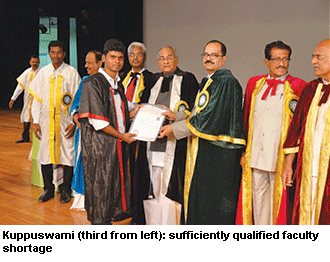 The steep fall in the demand for engineering education in Tamil Nadu (pop.72.1 million) is threatening the very existence of several of the state’s 496 private engineering colleges (out of a total of 527) affiliated with Anna University. This academic year (2017-18), more than 50 percent of the 261,692 undergraduate engineering seats (175,500 from the government quota and 86,192 from the management quota) remained vacant after admissions were completed on August 11. Over 100 private colleges had no takers at all, 50 colleges attracted less than 10 students and 250 colleges enrolled less than 100.
The steep fall in the demand for engineering education in Tamil Nadu (pop.72.1 million) is threatening the very existence of several of the state’s 496 private engineering colleges (out of a total of 527) affiliated with Anna University. This academic year (2017-18), more than 50 percent of the 261,692 undergraduate engineering seats (175,500 from the government quota and 86,192 from the management quota) remained vacant after admissions were completed on August 11. Over 100 private colleges had no takers at all, 50 colleges attracted less than 10 students and 250 colleges enrolled less than 100.
Although the phenomenon of the great majority of the state’s private engineering colleges staring at vacancies has been recurring year after year since 2011, in the past two years the situation has deteriorated, forcing several private colleges to seriously consider closure. Five private engineering colleges have already applied to the Delhi-based All India Council for Technical Education (AICTE) — the apex regulatory body for licensing and administering technical higher education institutions countrywide — seeking permission to close down, and over 20 colleges didn’t participate in the admissions process this year, while several others are seeking reduction of intake capacity in certain disciplines.
Educationists and academics cite several reasons for the crisis in engineering education in the state. The consensus is that capacity creation in engineering colleges is far outstripping demand, and the quality of education dispensed by a large number of private engineering colleges in Tamil Nadu, most of them promoted by politicians, is plunging. “Nowadays, students have become more discriminating and the quality of faculty is the main criterion for selecting engineering colleges. Most private engineering colleges in Tamil Nadu recruit fresh graduates as faculty who are only capable of coaching students to pass examinations and are ignorant about industry needs. There is urgent need to provide industry training to faculty so that they can impart contemporary engineering education to students. Colleges also need to attract well-qualified faculty by offering market-driven pay scales,” says S. Kuppuswami, principal of the highly-ranked Erode-based Kongu Engineering College.
At the centre of this ballooning crisis in engineering education, however, is the huge demand-supply disequilibrium for which AICTE is primarily to be blamed. For over a decade, AICTE has been recklessly licensing private engineering colleges in Tamil Nadu without checking whether the colleges have adequate and well qualified faculty and satisfy other critical requirements. The number of engineering colleges in the state has more than doubled from 237 in 2005-06 to 571 in 2015-16 and currently stands at 527, even as the demand for engineers from the IT industry which soared between 2005-2013 began tapering off after 2014, due to the slow growth of the IT industry and economy in general.
According to informed educationists, the great majority of Tamil Nadu’s engineering colleges have begun feeling the crunch acutely in the past two years when automation and artificial intelligence in the West began reducing dependence on outsourcing. Consequently, campus recruitments declined gradually from the year 2015 and has dropped steeply by 40-50 percent in 2017 with multinational IT firms restricting themselves to recruiting students from top-ranked engineering colleges which teach advanced technologies and coding. Moreover institutional rankings in the media (including EducationWorld) has begun to assume importance.
“Most campus recruiters give wide berth to poorly ranked engineering colleges as the graduates churned out by them require prolonged in-house training. This is because merit is not the criterion for admission and students with just 40 percent marks in their school leaving exams and without any real interest or aptitude for engineering are admitted into low-ranked engineering colleges. However, rather belatedly, AICTE is waking up to the ill-effects of reckless licensing and is urging engineering colleges to obtain National Board of Accreditation (NBA) certification for their courses. Sadly, although the ministry of human resource development has made NBA certification mandatory for all technical institutions only 10 percent of engineering colleges possess it. Accreditation is the only way to judge the quality of a course and campus recruiters are beginning to visit colleges offering NBA certified courses,” says education consultant Moorthy Selvakumaran.
With prospects of graduates getting placed in large software multinationals fast dimming, engineering education has lost its lustre with a rising number of students signing up for arts and science and other professional study programmes which offer better employment prospects. Moreover, with the AICTE having decided to shut down all engineering and technical institutions which have recorded less than 30 percent student intake in the past five years, private engineering colleges in Tamil Nadu need to seriously consider diversification or other strategies. Just plodding along is no longer an option.
Hemalatha Raghupathi (Chennai)